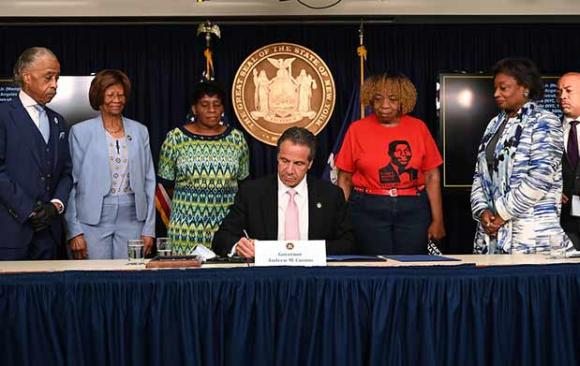


Governor Cuomo Signs ‘Say Their Name’ repealing 50-a and banning Chokeholds and much more…reforms Include repealing 50-a; banning chokeholds; prohibiting race-based 911 Calls; and appointing Attorney General as Independent prosecutor for police involved deaths
Following Killing of George Floyd, Governor Proposed the ‘Say Their Name’ Reform Agenda to reduce inequality and reimagine the State’s Criminal Justice System
By repealing 50-A, Gov. Cuomo legislation will prevent the NYPD and other police departments in the state to keep disciplinary and personnel records secret.
The measure — passed by the Legislature this week as part of a package of law enforcement reforms following the death of George Floyd — repeals 50-a, a section of New York law dating back to 1976 that allowed police, fire and corrections departments to keep disciplinary and personnel records under wraps.
“There’s no trust and if there is no trust, the relationship doesn’t work,” the governor said, “If there’s no trust, the police can’t effectively police. If there’s no trust, the community is not going to allow the police to police. He added, “There is no trust or there is a breach of the trust and that has to be restored.”
New York’s section 50-a, which passed in 1976, stated that “personnel records [of police officers] used to evaluate performance toward continued employment or promotion” were confidential and couldn’t be disclosed without the officer’s permission or a court order (with a few exceptions including district attorneys).
According to a legislative memo written at the time, the law was intended to prevent defense attorneys from going on “fishing expeditions” by placing broad subpoenas of officer misconduct records. But over time, the police department and the highest court in the state came to interpret the law as barring any police officer misconduct records from disclosure under the state’s open record law (misconduct records of firefighters and correction officers were later added to the law). This secrecy increased in recent years, such as when the police department even stopped publicly posting outcomes of disciplinary trials of officers.
“50-a was arguably the worst law in the nation when it comes to the public’s ability to access these records,” said Michael Sisitzky, lead policy counsel at the New York Civil Liberties Union, a group that has often filed freedom of information requests for police records and had long been denied.
The law was originally introduced by former New York State Senator Frank Padavan in 1976. According to Senator Padavan, the purpose of the bill was to protect police officers from “harassment,” and impeachment by unsubstantiated civilian complaints. It was never intended to block the disclosure of substantiated findings of police misconduct. However, caselaw has expanded protection to include such records.
The new law, effective immediately, makes disciplinary records subject to Freedom of Information Law requests from journalists and the public, shining a light on the well-guarded files after decades of secrecy.
“The truth is this: Police reform is long overdue, and Mr. Floyd’s murder is just the most recent murder," Cuomo said. “It’s about being here before — many, many times before.”